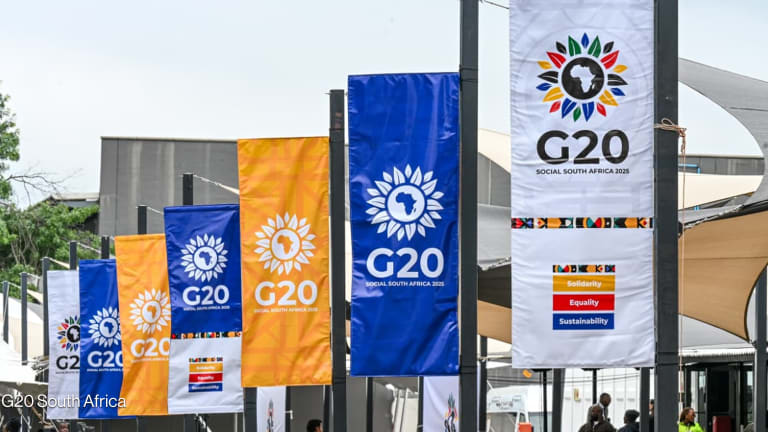
With Queen Elizabeth II urging heads of government to select Prince Charles to succeed her as head of the Commonwealth, it appears the debate about who will take up the reins will soon be over. This follows significant speculation and hopefully clears the path for a meaningful discussion as formal talks get underway today.
One of the key questions on the agenda of this year’s Commonwealth Heads of Government meeting — and a much more important one for most citizens of Commonwealth countries — is: how can the Commonwealth help lead the world in championing free and fairer trade and catalyzing growth? A tough question at best, but one that feels even more complicated in the context of a U.S.-China trade war and the decade-long deadlock on global trade talks. And of course, Brexit has cast uncertainty not just over U.K. prospects, but also over those of Commonwealth countries — not least, low-income countries that may lose preferential access to the U.K. market.
See more coverage of the Commonwealth Heads of Government meeting:
► How DFID plans to use insurance to build resilience in small island states
► Commonwealth Summit launches in London amid concerns over LGBTQ rights, jobs
Crown Agents is no stranger to the challenges of improving trade. Our mission, established in 1833, was to manage grants, raise capital, and ship supplies between the U.K. and 13 of today’s Commonwealth countries, introducing new work systems and reforming the ways services were paid for. If we are to see a world where all countries are on the path to self-sufficiency and prosperity — or, in the words, of the Commonwealth, one where “all its citizens have a prosperous, secure, sustainable, and fair future” — trade has to be at the center of the global plan.
This year’s meeting provides British Prime Minister Theresa May with a double opportunity: not only to forge new trade relationships with her Commonwealth partners, but also to take a global leadership role on the flagging multilateral trade agenda. The return of protectionism in the U.S. and China threatens particular harm to developing countries, undoing progress made since the World Trade Organization pledged better terms of trade for the poorest in 2001. This urgently needs addressing by the U.K. and others, and Brexit could provide the political motivation to revive momentum.
So as the Commonwealth heads of state prepare for the Leaders’ Retreat at Windsor Castle, I’d like to share three lessons about what we’ve learned from our experience working with governments all over the world to help them improve their trade and grow their economies.
1. Lead the way on the WTO’s Trade Facilitation Agreement
In 2017, members of the World Trade Organization ratified the Trade Facilitation Agreement, which aims to simplify and modernize export and import processes. But visible concrete actions toward meeting the commitments of the agreement have been slow to materialize.
Yet if the world is to keep up effective cross-border trade, it has to get rid of red tape (duplicate forms and the like), prevent corrupt officials from slowing goods moving through customs, and align quality and safety standards on goods.
Crown Agents’ own experience shows how effective these steps can be. Our work to modernize South Sudan’s customs and eradicate corruption by revising policies, helping to automate procedures, and training staff reduced the administrative burden on traders at the border with Uganda by up to 50 percent.
If the Trade Facilitation Agreement is properly implemented, it could reduce trade costs for low-income countries by 14.1 percent and boost global trade by up to $1 trillion per year, according to the Organisation for Economic Co-operation and Development.
The U.K. government has shown admirable commitment to trade facilitation support via dedicated funding, and May’s announcement this week of technical assistance to Commonwealth partners is very welcome. But by encouraging the Commonwealth as a whole to meet their own TFA obligations, the benefits to global prosperity could be huge.
2. Make the U.K. the number 1 destination in Europe for low-income country exports
Rich countries’ trade policies are an important factor in low-income countries’ development. Yet the EU operates an unfavorable level of trade protection, which risks stunting developing country growth.
Post-Brexit, the U.K. will be able to make it easier for developing country exporters to enter the U.K. market by lowering tariffs and cutting red tape. This will not only benefit developing country economies through job creation and integration into global value chains, but it will save money for U.K. importers and provide value and choices to U.K. consumers.
Supporting capacity building around the Commonwealth will also be critical. Crown Agents’ own work training small- and medium-sized businesses in Ukraine, Moldova, Belarus, and Romania has led to increased confidence to export.
3. Get the U.K. private sector investing in emerging markets
The days when Britain led the world in investment in Africa’s infrastructure have passed. For example: While the U.K. government has been willing to back up to 800 million pounds of loan finance to help the U.K. private sector win contracts in Nigeria, in January, companies had taken up only 5 million of that support.
The U.K. government can take action to improve this. They currently operate a number of different schemes to encourage U.K. businesses to export to perceived “riskier” markets such as Nigeria. But the approach is not as strategic as it could be — for example, with programs focusing on different countries and owned by different government departments — and the range of support can be bewildering to new would-be exporters.
A more focused, longer term approach by the U.K. government to build an export base in developing countries could be a game-changer. The U.K. could become the destination of choice for low-income country exports, and the partner of choice for significant investment and export deals in the big new markets of the future, guaranteeing mutual prosperity for the long term.








